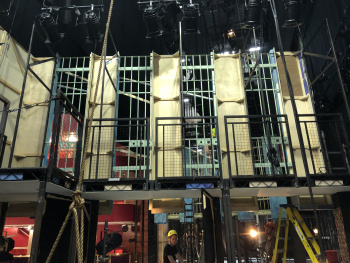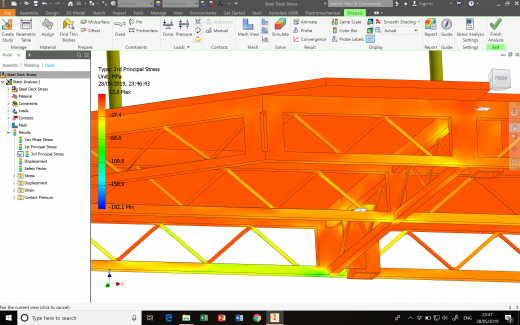Dead Man Walking: Difference between revisions
Cstevenson (talk | contribs) No edit summary |
No edit summary |
||
| (9 intermediate revisions by 2 users not shown) | |||
| Line 44: | Line 44: | ||
=Overview= | =Overview= | ||
This particular production was a special one for the Conservatoire as it was the UK Premier of the opera. Designed by Adrian Linford and Directed by Caroline Clegg, the production opens with a gruesome rape/murder scene which sets the overall dark theme of the production. The prelude ends and the entire feel of the production is transformed from a cold prison into a summery, Sunday school with a cast of child performers. The opera develops the story of Joseph De Rocher and the connection he has with Sister Helen Prejean. Act one erupts into an impressively powerful display of vocals from the large cast and the decision to sentence Joseph to death is made. | |||
Act 2 develops the feelings between Sister Helen and Jo and allows the audience to overlook the horrific crime he committed with his brother in the prelude, only to drench it all back towards the end of the act with another display of operatic power during the 'dead man walking' death march to the execution chamber. The production ends on the death of Jo and the heartfelt hymn by a solo Sister Helen. | |||
== Stage Management == | |||
Stage Manager - [[Poppy Apter]] | |||
Deputy Stage Manager - [[Rachel Matthews]] | |||
Assistant Stage Managers - [[Conor Brown]], [[Hannah Henderson]], [[Noah Dates]] and [[Stuart Henderson]] | |||
This was a complicated show with a large cast of roughly 60 performers, plus the orchestra. It also included various prop elements which required time and thought, including; blood, weapons, fire and manacles. | |||
Below is a document detailing how Opera 2 works at the RCS, with a specific focus on the role of an ASM as it is the role which strays furthest from a traditional opera ASM's role. This may be useful for future Opera 2 stage managers when managing their team of 4 ASMs. | |||
[[File:Opera_2_at_RCS.png]] | |||
== The Technical Stage Department == | == The Technical Stage Department == | ||
Stage supervisor - [[Regan Kelly]] | Stage supervisor - [[Regan Kelly]] | ||
Head of Automation and Flys - [[Daryl Campbell]] | |||
The production design was fairly simplistic, yet beautiful and very effective in setting the environment for every scene. There were no large set changes or major flown items; A three dimensional cloth, painted in the form of three large red geraniums was the brunt of the productions flown pieces - along with a small frame of gauze painted eyes. | |||
The set itself consisted of steel deck balconies with steel support structure and an array of aesthetic 3m tall panels of wood cladding and prison bars attached to the front section of the decks. The balconies were running US/DS, tapering towards the US to meet a large vac-formed rear wall. Please see image below for more detail: | |||
[[File:DMW Cloth and Walls.jpeg|350px]] | |||
[[File:DMW Steel Structure.jpeg|350px]] | |||
In this production there weren't any major technical effects being produced, it was simply a case of installing steel deck and getting the right formation of masking to hide the upper balconies. | |||
Automation was used to lift to truss lengths behind each balcony section on which lighting ladders were hung. | |||
An interesting technical feature is the USL balcony section that protrudes out from the rest of the SL balcony. This section is a custom altered piece of steel deck. The structure of the corner of the deck was severed and welded into a chamfered edge. The deck was also cantilevered - meaning from the auditorium it appeared to be a structural overlook balcony. The TSD department assisted the workshop department in performer preliminary CAD structural tests on the design to ensure the design proposed would be suitable for cantilevering. Below are images of the structural tests with a force of 4200N (the weight of a 500kg mass on the balcony end): | |||
[[File:DMW_-_Cantileaver.png|350px]] | |||
[[File:DMW_-_Cantileaver_Stress_1.png|520px]] | |||
[[File:DMW_-_Cantileaver_Stress_2.png|520px]] | |||
As expected the offstage side of the webbing on the steel deck structure is experiencing the most structural stress however the deck itself is experiencing minimal deflection. A practical test can now be done safely. | |||
== Flys and Automation == | == Flys and Automation == | ||
Latest revision as of 11:26, 29 May 2019
| Dead Man Walking | |
|---|---|
| Summary | |
| Location New Athenaeum Theatre
| |
| Creative Team | |
| Director Carolione Clegg
| |
| Set & costume `Desginer Adrian Linford
| |
| Lighting Designer | |
| Sound Designer | |
| Production Team | |
| Production Manager Kevin Murray
| |
| Stage Manager | |
| Deputy Stage Manager | |
| Assistant Stage Managers [[]], [[]], [[]]
| |
| Production Electrician | |
| Lighting Programmer | |
| Stage Supervisor | |
| Head of Automation and Flys | |
| Assistant Stage Supervisors | |
Overview
This particular production was a special one for the Conservatoire as it was the UK Premier of the opera. Designed by Adrian Linford and Directed by Caroline Clegg, the production opens with a gruesome rape/murder scene which sets the overall dark theme of the production. The prelude ends and the entire feel of the production is transformed from a cold prison into a summery, Sunday school with a cast of child performers. The opera develops the story of Joseph De Rocher and the connection he has with Sister Helen Prejean. Act one erupts into an impressively powerful display of vocals from the large cast and the decision to sentence Joseph to death is made.
Act 2 develops the feelings between Sister Helen and Jo and allows the audience to overlook the horrific crime he committed with his brother in the prelude, only to drench it all back towards the end of the act with another display of operatic power during the 'dead man walking' death march to the execution chamber. The production ends on the death of Jo and the heartfelt hymn by a solo Sister Helen.
Stage Management
Stage Manager - Poppy Apter Deputy Stage Manager - Rachel Matthews Assistant Stage Managers - Conor Brown, Hannah Henderson, Noah Dates and Stuart Henderson
This was a complicated show with a large cast of roughly 60 performers, plus the orchestra. It also included various prop elements which required time and thought, including; blood, weapons, fire and manacles.
Below is a document detailing how Opera 2 works at the RCS, with a specific focus on the role of an ASM as it is the role which strays furthest from a traditional opera ASM's role. This may be useful for future Opera 2 stage managers when managing their team of 4 ASMs.
The Technical Stage Department
Stage supervisor - Regan Kelly Head of Automation and Flys - Daryl Campbell
The production design was fairly simplistic, yet beautiful and very effective in setting the environment for every scene. There were no large set changes or major flown items; A three dimensional cloth, painted in the form of three large red geraniums was the brunt of the productions flown pieces - along with a small frame of gauze painted eyes.
The set itself consisted of steel deck balconies with steel support structure and an array of aesthetic 3m tall panels of wood cladding and prison bars attached to the front section of the decks. The balconies were running US/DS, tapering towards the US to meet a large vac-formed rear wall. Please see image below for more detail:
In this production there weren't any major technical effects being produced, it was simply a case of installing steel deck and getting the right formation of masking to hide the upper balconies.
Automation was used to lift to truss lengths behind each balcony section on which lighting ladders were hung.
An interesting technical feature is the USL balcony section that protrudes out from the rest of the SL balcony. This section is a custom altered piece of steel deck. The structure of the corner of the deck was severed and welded into a chamfered edge. The deck was also cantilevered - meaning from the auditorium it appeared to be a structural overlook balcony. The TSD department assisted the workshop department in performer preliminary CAD structural tests on the design to ensure the design proposed would be suitable for cantilevering. Below are images of the structural tests with a force of 4200N (the weight of a 500kg mass on the balcony end):
As expected the offstage side of the webbing on the steel deck structure is experiencing the most structural stress however the deck itself is experiencing minimal deflection. A practical test can now be done safely.
Flys and Automation
Paper Work
File:Dead_man_walking_fly_cue_sheet_.pdf
File:Fly_Rail_Label_K.pdf
File:Flys_check_list.pdf
Lighting Department
Lighting Designer - Craig Stevenson
Production Electrician - Adlai Faigen
Lighting Programmer - Matthew Craigen
Lighting Crew - Nicholas Ruebenacker Lea Meloee
Lighting Plans





